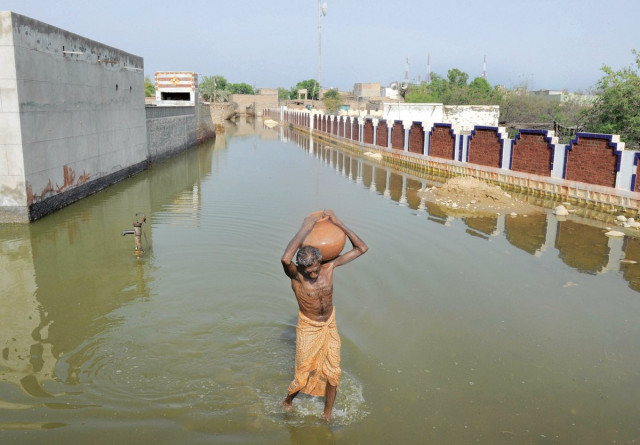Six flood survivors electrocuted
Six people were killed and a dozen others were injured when their tractor trolley hit a live high-tension wire.

A group of flood survivors, including women, from the kachcha area near Kashmore had gone to Faiz Mohammad Khoso to get fodder for their cattle.
After loading their tractor with grass, they set off for their journey home.
Just outside the village, there was an electric wire dangling loose and hanging low over the road. One of the villagers tried to push the wire away with a bamboo stick but somehow the wire hit the tractor, passing high voltage through the vehicle and electrocuting the passengers.
Those killed were identified as Ghulam Sarwar Malik, Mehrab Malik, Shani, Habiba, Bhirai and Gori. The injured were shifted to a hospital in Kashmore.
The Sukkur Electric Power Company (Sepco) has ordered an inquiry into the incident.
Sindh Chief Minister Qaim Ali Shah expressed sorrow over the deaths and offered condolences to those injured. He instructed Kashmore DCO, DPO and other relevant officials to look after the injured persons and provide them with the best medical treatment.
Power woes in Sukkur
It can happen up to 30 times a day- a blue spark, a loud pop and the smell of burning rubber. Appliances across Sukkur are turning into useless pieces of junk due to frequent tripping of feeders.
Residents of Sukkur, the headquarters of the newly created Sepco, complain of prolonged power outages, made worse by the tripping of feeders which can happen more than 30 times in a day.
The city grid station supplies electricity to 10 feeders in the city centre and everyday it comes closer to a breakdown, residents claim. The grid station has been working under high strain for the last five years but no long-term maintenance has been carried out. To relieve the station of some of its load, a new heavy duty transformer with a capacity of 40 MVA was installed at the SITE grid station. The plan was to shift some of the feeders supported by the city station to the new one. However, eight months later, only two feeders of the SITE station have been shifted to the new transformer, leaving the city grid station as overworked as before.
A few days before Ramazan started, delegations of citizens and trade bodies met with the chief engineer power Sukkur, Shamsuddin Shaikh, and told him about the suffering cause by frequent power breakdowns and tripping. Shaikh had reassured them and promised to shift some of the city grid station feeders to the transformer, so that the electricity problems would subside, at least during Ramazan. However, 10 days into the holy month, the promise has yet to materialise.
Officials at the city grid station shrug off any responsibility in the matter. “The transformers at the grid station are overloaded, when the load is too much they trip,” explained officials, advising people to contact Sepco, which is at the helm of affairs. Sepco officials, however, were accused of not attending calls.
With nobody to claim responsibility, residents across Sukkur continue to lose their computers, blenders and toasters to short-circuiting.
‘Floods pose no threat to Shahbaz airbase’
Reports of the floodwater being diverted to save the Shahbaz airbase were brushed aside by the Pakistan Air Force (PAF) as they claimed that the base was completely under their control.
“The floods have not threatened the airbase as it is five feet above ground level and the flow of water can only touch the floor of the base in the worst case scenario,” air vice-marshal Arshad Quddus of the PAF southern air command told the media on Saturday. The PAF arranged for a tour for the media from Islamabad to Jacobabad, Sibbi and Sukkur after a statement by a senior health ministry official in the senate committee on health, in which the official claimed that relief operations in Jacobabad cannot be put into effect because the only airbase in the area was being used by the Americans.
The media was also given a tour around the base, which appeared to be inhabited only by the PAF personnel, at the end of which Quddus said that the base was playing an important role in relief operations. An air bridge has been set up between the Shahbaz airbase and other airbases to supply relief goods as well as evacuate people from Jacobabad and its surrounding areas, said the AVM, who added that medical assistance is also being provided to the people in the towns near the airbase.
“The Shahbaz airbase is the hub of rescue and relief operations in the area,” said Quddus, who added that some Americans were also living on the airbase but this was only to provide technical assistance to the air force, which had recently acquired the upgraded F-16 fighter jets from Washington.
Published in The Express Tribune, August 22nd, 2010.



















COMMENTS
Comments are moderated and generally will be posted if they are on-topic and not abusive.
For more information, please see our Comments FAQ